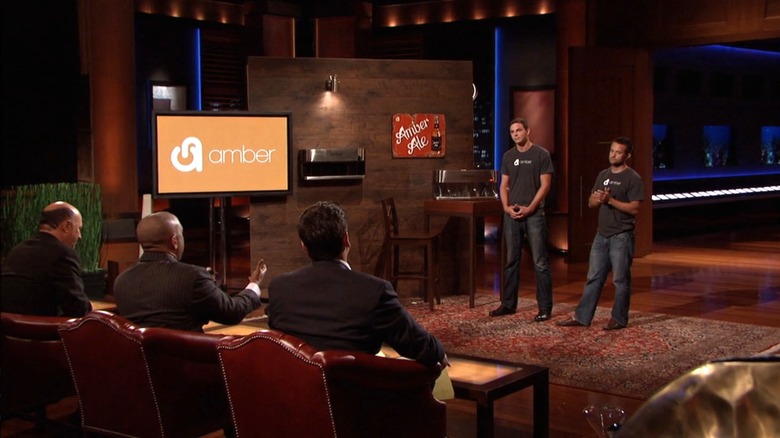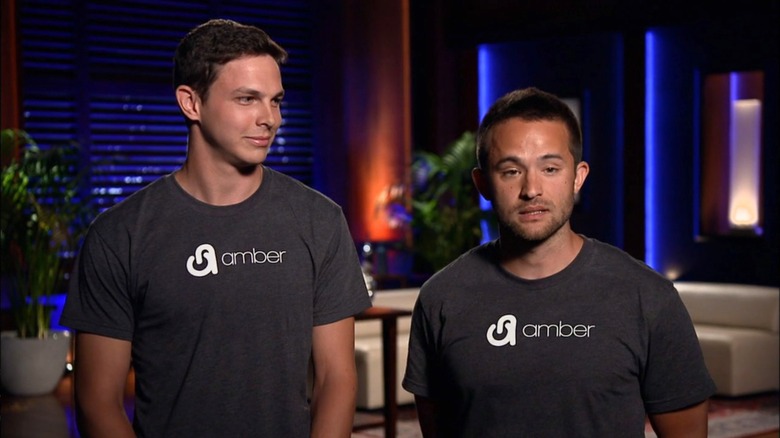What Happened To Amber Phone Charging Station From Shark Tank Season 6?
Funding a tech startup can be a major gamble to say the least. To have any chance of beating out big-name competitors and shifting consumer habits will require a sizable investment of time, money, and strategy. But if anyone knows how turn a startup into a success story, it's the panel of celebrity investors on the hit ABC series "Shark Tank." Entrepreneurs with a potentially successful idea, a tireless work ethic, and some tough skin have the chance of walking away with a lucrative investment and making their dreams come true.
This was true of Bill Shuey and Kyle Byrd when they arrived on set to pitch their tech company "Amber" on the show's sixth season. The company's signature creation is a public phone charging station meant to be installed in public places such as airports, hotels, bars, and more. Meant to be a safer alternative to potentially risky public USB ports or traditional free charging stations, users can access any available compartment to charge their phone on the Amber by scanning their fingerprint.
The creation of the Amber came about in late 2013 after Shuey's phone died on him unexpectedly while out at a restaurant. Realizing the need for more safe public charging stations, the James Madison University political science student went to work conceptualizing what would eventually become the Amber Charging Station, getting additional aid from Byrd as a product designer and business partner, as well as JMU professors. Word soon got around to the producers of "Shark Tank," who offered the duo a chance to audition for the show in spring 2014 before eventually having their episode filmed in June.
What happened to Amber Phone Charging Station on Shark Tank?
Entrepreneurs Bill Shuey and Kyle Byrd sought a $200,000 investment for a 20% equity stake in Amber. Their presentation opened with a demonstration of Amber's abilities and a rundown of their ambitions with the product. But that excitement washed away as soon as the duo shared that their company was in the pre-revenue stage.
They went on to explain their model, where business owners had the choice of paying $2,000 per unit or leasing it for a six to nine months for a $150 monthly fee. They believed that their device gives users peace of mind knowing where their phone is and that it's safe. However, Robert Herjavec wasn't so confident in that assumption. With years of experience in cyber security, he noted that lower-end fingerprint scanners are prone to malfunctioning. The sharks also weren't thrilled by the company's margins, with each unit costing around $1,000 to produce.
Overall, the investors saw this as a largely useless device and didn't hold back in their criticisms. Lori Greiner shared that she was working on a far better product at the moment, Mark Cuban thought their production costs were way too high, and Herjavec didn't think they had a chance against far lower-priced competitors. Kevin O'Leary went as far as saying, "There's only one answer to this, I have to hire you both so I can fire you," before calling it one of the worst ideas he'd ever seen. The two left the tank without a deal, with Shuey commenting afterwards about the experience, "I mean I would probably go rail Herjavec in the teeth."
Amber Phone Charging Station after Shark Tank
The Amber episode of "Shark Tank" would air on Sept. 26, 2014 as part of the show's sixth season premiere. With what has widely been hailed as one of the worst "Shark Tank" pitches alongside other infamous businesses such as PavLock and Ionic Ear, the Amber team were certainly hurt by the bad rep, which made getting their product off the ground all the more difficult. Nevertheless, Bill Shuey and Kyle Byrd kept their spirits high in the show's immediate aftermath.
The two received a wide variety of reactions from "Shark Tank" viewers, ranging from supportive gestures to personal insults and attacks. While the team acknowledged that the sharks' comments were largely justified given the premature nature of their business, they felt that the show's depiction of their character was largely inaccurate. "We were portrayed as young college frat boys patching together a makeshift company and that story is far from the truth," Byrd shared in a Medium article. He went on to add that Shuey's harsh words towards Robert Herjavec were out of passion given his admirable work ethic.
Taking the sharks' critiques to heart, the team worked to refine their business model and strategy. They went on to introduce some notable improvements such as cutting down the production costs to $75 a unit, implementing a rewards program, employing an efficient metric tracking system, and utilizing a pay-per-use app to aid in profit margins. Sadly, even with these enhancements, the damage was done.
Why did Amber Phone Charging Station go out of business?
Prior to airing on "Shark Tank," the Amber duo expressed their determination to continue their business no matter the outcome, with co-founder Bill Shuey saying in an interview with The Breeze, "Once entrepreneurship bites you, it doesn't let go. We'll sometimes throw other ideas around but right now we have to stay focused on Amber." It's safe to say that this mindset didn't last long.
Despite their ambitions and efforts to improve the business, the plug was pulled on Amber by December 2015. As of this writing, Amber's Instagram and X accounts have not seen any posts since early 2015, while its Facebook page and website have gone entirely defunct. In many instances, even pitches that fail to get a shark on board can at least drum up some business from viewers within the following days or weeks of the episode's broadcast, a phenomenon commonly referred to as the "Shark Tank" effect.
Regarding their lack of such a response, Byrd believed that their target buyers, mainly other business owners, were unlikely to be a sizable enough portion of the "Shark Tank" audience to be reliably tuned in on the night of the episode's broadcast. More importantly, he admitted that the team's focus was not where it should've been. "We didn't treat the product as the cornerstone of the business," he said in a 2017 Daily News-Record interview. "It was all about meeting the next investors ... It got to the point that these funding rounds ended up being the success criteria. That's dangerous."
What's next for Amber Phone Charging Station's founders?
"Shark Tank" taught Bill Shuey and Kyle Byrd that all the good intent and ambition in the world won't do you any good without a proven product, especially in the tech industry where the competition and risks are so high. Byrd perhaps put it best in his Medium article where he wrote, "Just because Shark Tank reached out to us, we should not have gone on; we weren't ready."
With Amber long gone, where are the entrepreneurs now? Despite his outspoken nature on the show, Shuey has the most reserved presence online between the two. His most recent ventures have been in sales according to his LinkedIn, where Shuey initially worked for Brown's Car Stores until October 2016 before moving into his current position with the home improvement company Long Fence and Home.
Byrd has experienced a varied career in product design and management roles. These include working as a product designer for the Virginia-based advertising firm Resonate, a product design lead and manager for software developer Atlassian, and Head of Product for platform design Dotwork. Alongside fellow Dotwork employee John May, he is the co-founder of The Uncertainty Project, a set of strategic online managing tools, which was launched in October 2022.



